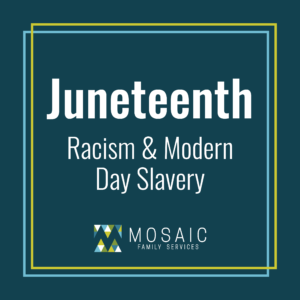
For generations, Black communities in Texas and across the nation have celebrated Juneteenth, the day when federal troops arrived in Galveston, Texas in 1865 to proclaim that all enslaved people were freed. The troops’ arrival came a full two and a half years after the signing of the Emancipation Proclamation.
In 2000, Congress passed the Trafficking Victim Protection Act, which provided a legal definition of labor trafficking and sex trafficking. While the United States government did not define “human trafficking” until the 20th century, the terms have been utilized and politicized throughout history and still to this day.
Racism is deeply embedded in both the perpetuation of human trafficking and the anti-trafficking movement.
“The racialized sexual exploitation of people of color that developed during slavery and colonization impacts cultural expectations and beliefs about the availability and use of children of color for commercial sex today.” (The Racial Roots of Human Trafficking, UCLA Law Review, 2015).
Historically, the narrative surrounding human trafficking has been focused on the victimization of young, white women, and often excluded nonwhite people from legal protection. What is now considered human trafficking, was previously recognized in the US as “white slavery,” and only applied to the trafficking of a white woman and ignored labor trafficking altogether. Black women and other People of Color were not uniformly recognized as crime victims.
“The white slavery campaign ignored the pervasiveness of sex trafficking of Black women and girls. For example, during the Great Migration, employment agencies in northern American cities recruited Black women from the South to come to Boston, Chicago, and New York for promised jobs in factories, department stores, and other reputable businesses. When the women arrived, however, their bags were confiscated and they were sent to work in brothels as prostitutes, or as maids. Black girls, unlike white girls, were not protected by early pandering laws.
This refusal to recognize women and girls of color as victims of forced prostitution perpetuates the Jezebel myth that Black women would always consent to sex. Indeed, because the law “did little to discourage White men who were determined to have their way with Black women,” the alleged rape of a Black woman—particularly at the hands of a White man—has traditionally not been recognized as a crime. Further, the claim that, “Black women do not experience coerced sex in the sense that white women experience it… reflect[s] a set of myths about Black women’s supposed promiscuity which were used to excuse white men’s sexual abuse.”
The impact of white slavery on the antitrafficking movement can still be seen today – especially in the way that Black trafficking survivors are treated in comparison to white survivors. Black survivors are not looked at as victims, their stories are scrutinized by law enforcement and anti-trafficking agencies.
“Today, “the criminal justice system continues to take the rape of Black women less seriously than the rape of white women.” The intentional marginalization of women and girls of color was reflected not only in the rhetoric of the white slavery movement but also in the State’s legal response.”
Human trafficking has a heavy and broad impact on communities of color, but historically, the anti-trafficking movement focuses on the idea of white women being forced into prostitution by men who prey on women and children at random.
This idea of human trafficking is dangerous and dishonest as it doesn’t recognize the reality of human trafficking or the role systemic racism has on the perpetuation of human trafficking. This concept also ignores the many factors that can lead to a person falling victim to trafficking, including homelessness, poverty, immigration and family violence – all of which also relate to institutionalized racism.
It’s true, that anyone can be a victim of trafficking, regardless of race. But it’s important to recognize many human trafficking survivors are People of Color and amplify their voices as they have been left out of the anti-trafficking narrative for too long.
On Juneteenth, we celebrate freedom for all and the beginning of a new era in the United States. Even though slavery was abolished, racism, discrimination and oppression against Black people still exists to this day, and is evident in the anti-trafficking movement.
It’s time to recognize this racism and commit to change by believing all survivors, listening to the stories of Black survivors and stop treating Black trafficking survivors as criminals.
To learn more about the link between racism and human trafficking, read the report: The Racial Roots of Human Trafficking by Cheryl Nelson Butler.
